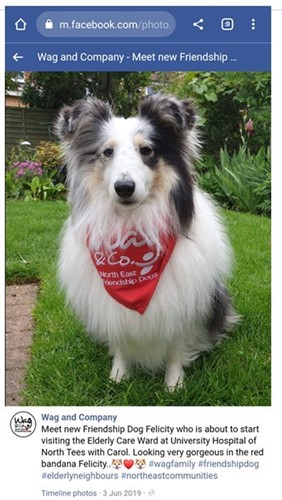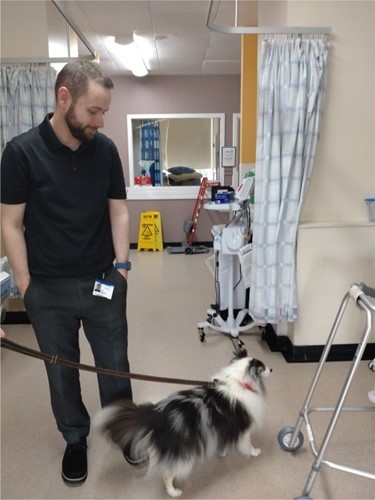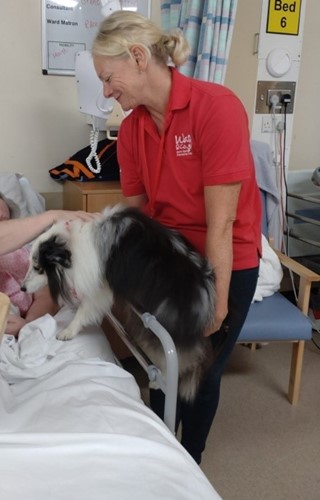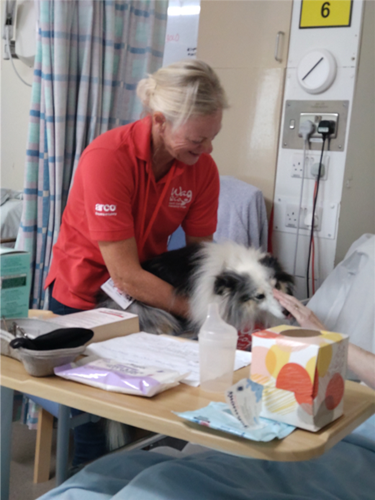‘Wag & Company’, a charity which provides animal assisted therapy to older people, was launched in May 2016. The Charity matches and enables professionally assessed volunteers and their dogs, known as ‘Visiting Wag Teams’, to safely offer one to two hour visits per week to older people in a variety of different settings across the North East region.
The initiative to investigate the benefits of pet therapy at North Tees & Hartlepool NHS Foundation Trust first came from a ward based therapy team working on the elderly care unit to help patients with dementia. Information gathered from the wider literature revealed evidence to support the benefits of ‘Animal Assisted Therapy’ in helping to reduce anxiety, improve physical health, cognitive function and overall health and well-being.
North Tees & Hartlepool NHS Foundation Trust teamed up with ‘Wag & Company’ in August 2019. The initial response to animal assisted therapy was positive. Staff working on the Dementia ward witnessed positive benefits to patients, particularly in the areas of a reduction in patient stress and agitation and improvements in mood, during the time the therapy dog spent on the ward.
Although therapy dog visits were suspended in 2019 due to the COVID pandemic, they resumed in 2021. Following on from the perceived benefits for dementia patients at North Tees, the next stage was to roll pet therapy out to other clinical areas.
A senior clinical practitioner who was a specialist in caring for patients who had experienced a fall, introduced her own Wag & Company professionally assessed and trained therapy dog, Felicity, on to the hospital’s orthopaedic ward.

‘In orthopaedics, we saw nine patients and the feedback was extremely positive. One particular patient was getting very upset during her stay – but when she saw Felicity her face lit up. They were both enamoured with each other! [Senior Clinical Practitioner]
Elderly patients often feel anxious about being in hospital and they want companionship. Through charities like Wag & Co it is now possible to help improve patient care in a hospital setting using pet therapy – it’s a fantastic development’.
[Senior Clinical Practitioner]
Since retiring from her professional post with the Trust, Felicity’s owner, continues to provide pet therapy sessions at North Tees Hospital on a weekly basis.
Felicity complies with the Veterinary Guidelines (informed by those of the Royal College of Nursing and Public Health England) which comform with national standards for visiting dogs.
In September 2023 the Library received the following Evidence Search request from a Cross Speciality Research Nurse:
‘I’m looking for some evidence relating to whether therapy dogs can aid post stroke recovery, specifically when used in an inpatient setting. The Stroke Unit is currently receiving visits from a therapy dog (Felicity) which patients are finding most therapeutic. I believe the initiative originally came from the ward based therapy team [working with dementia patients]. It will be good to review the evidence base for such with the aim of hopefully supporting/expanding same going forward.’
This request was timely, as a recommendation received from the Knowledge & Library Service Quality & Improvement Outcomes Framework Baseline Submission report (September 2022) highlighted the need for the library to capture evidence which demonstrates the positive benefits of knowledge mobilisation and its impact on patient care.
An evidence search was carried out based on the question, ‘Can therapy dogs aid post stroke recovery when used in an inpatient setting?’ Key words were identified, databases selected, limits set and 21 full-text evidence-based articles were e-mailed to the Cross Speciality Research Nurse for further evaluation.
All that was left to do was to wait for the impact feedback questionnaire to be returned, hopefully, providing some comment(s) about the usefulness (or not) of the evidence provided.
Theoretically, in ‘working like a librarian: exploring the role of animal-assisted therapy’, the Knowledge Specialist had completed the task of ‘mobilising’ knowledge and collecting evidence of ‘impact’– job done!
But, was this enough? What impact did the work carried out by the Knowledge Specialist effect in practice? What value did it add to patient care? Working in a role as librarian, it’s not always easy to assess outcomes of work undertaken.
To gain greater insight, the librarian arranged a visit to meet Felicity and her owner, to observe the impact animal assisted therapy in practice has on post stroke recovery patients in the Stroke Unit at University Hospital of North Tees.

‘I just wanted to thank you for arranging the visit to the Stroke Unit to meet Felicity and see her interact with the patients. It was a wonderful experience. Felicity really makes a difference to those she meets on the ward.’ [Library Officer]
‘It was very interesting hearing the patients talking and seeing them interact with Felicity and her owner. It encouraged those with speech and language difficulties to participate in conversation and helped those with cognitive impairment to share memories. Felicity certainly brightened the patients’ day – you could see that in their faces. Many commented on how they looked forward to the visits because they enjoyed the company and a cuddle from a furry friend.' [Librarian]
Some of the comments received from patients during the visit to the Stroke Unit
It reminds me of the dog I used to have years ago. He was a lovely friendly chap. Now, I think he was called Bobby – or was it Robby? Anyway, he had lovely brown eyes.
I think she [Felicity] is happy to see me – her tail is wagging away! it makes me happy when she comes to visit the ward. Brings a bit of the outside in.
Dogs are good company, aren’t they? She’s [Felicity] very good. She’s got lovely fur, hasn’t she? I like stroking her.
It doesn’t matter what you say to a dog – I mean I don’t talk much sense now – but I know she understands me.

‘Spending time on the ward made me reflect upon the role a Knowledge Specialist has in mobilising evidence into practice and it demonstrated how the incorporation of that evidence in to practice effects improvements to patient care'.
Seeing a therapy dog in action and the positive effect the experience had on the patients, brought to life the evidence presented in the Journal articles which were sourced for the literature review:
‘Can therapy dogs aid post stroke recovery when used in an inpatient setting?’
Time spent on the ward brought home that everything we do is for patient care.’ [Librarian]
This experience has provided an opportunity for the Knowledge Service to highlight how the provision of an ‘expert evidence search’ service supports clinical and non-clinical decision making for best patient care across the University Hospital of North Tees and Hartlepool NHS Foundation Trust. It has also enabled the Knowledge Specialist to demonstrate the benefits of her role in taking the ‘heavy lifting’ out of getting evidence into practice and providing ‘the gift of time’ to healthcare professionals. Above all, it offers Knowledge Specialists working in other health settings the reassurance that in utilising their particular skills, they can and do make a difference in helping to improve patient care.

